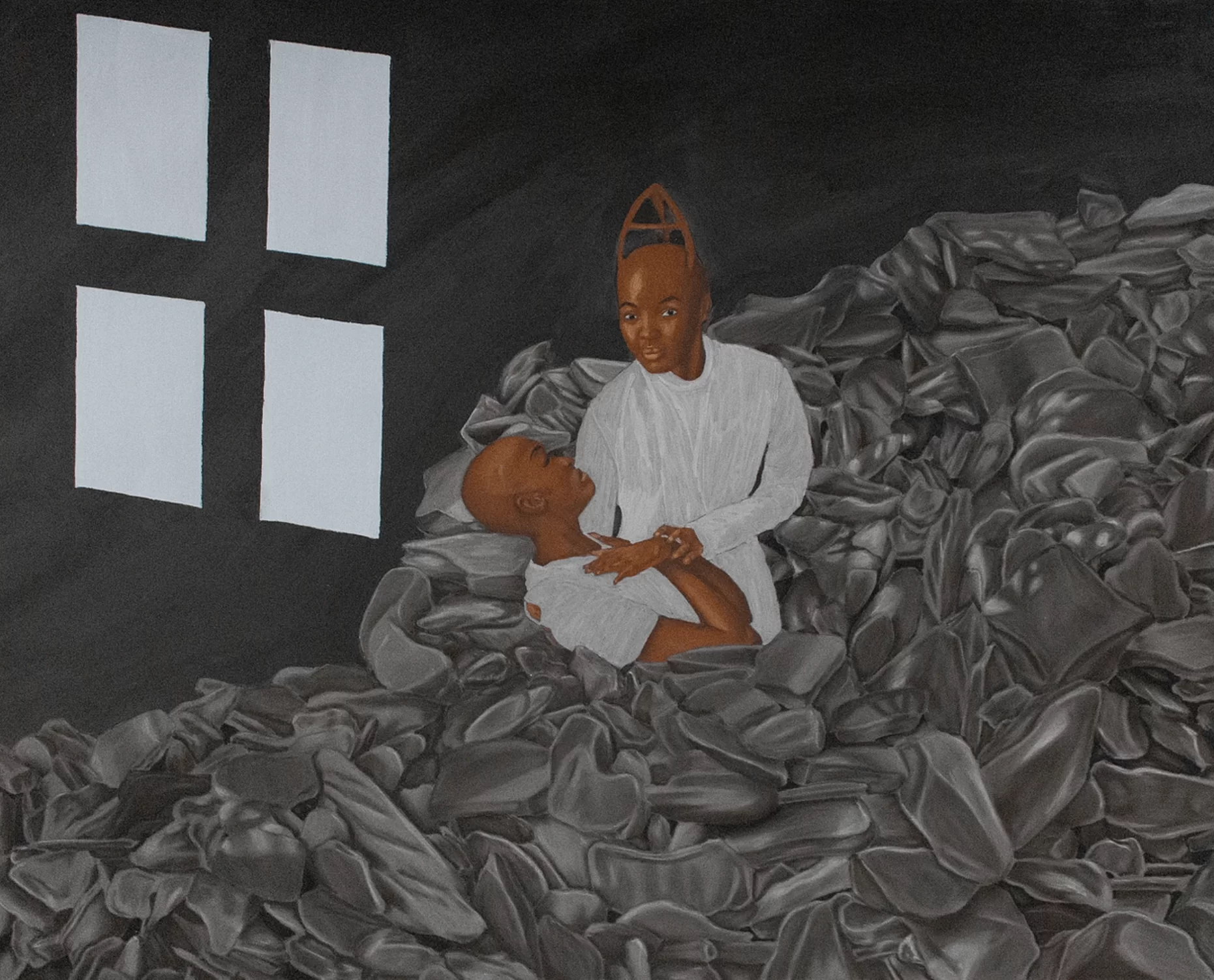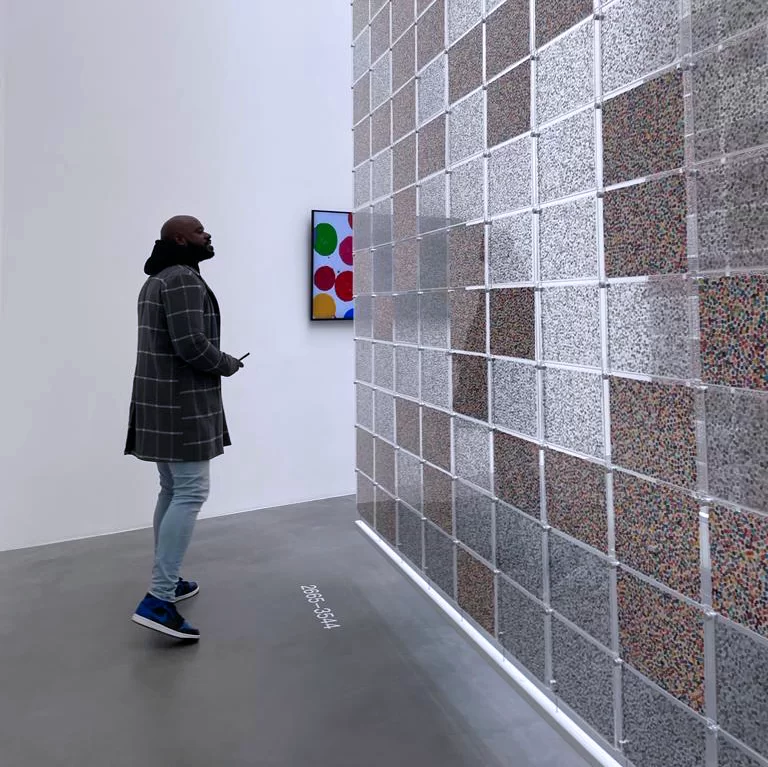I managed to catch up with emerging Nigerian artist Bunmi Agusto just before the launch of her forthcoming joint exhibition titled Everything Good Will Come.
Agusto examines the objects between modern and nostalgic Nigerian culture inspired by Sherry Turkle’s approach of evocative objects, as vessels securing personal histories and cultural identity.
Expressed in fascinating visuals conceived by her embrace of pastels and inks, her delicate yet purposeful motions inherits the underlying soul of surrealism with a refreshing contemporary attitude. Conveying emotional characteristic with a subtle palette. Encouraging the viewer to understand the figurative has much more at stake than what is visible on the surface.
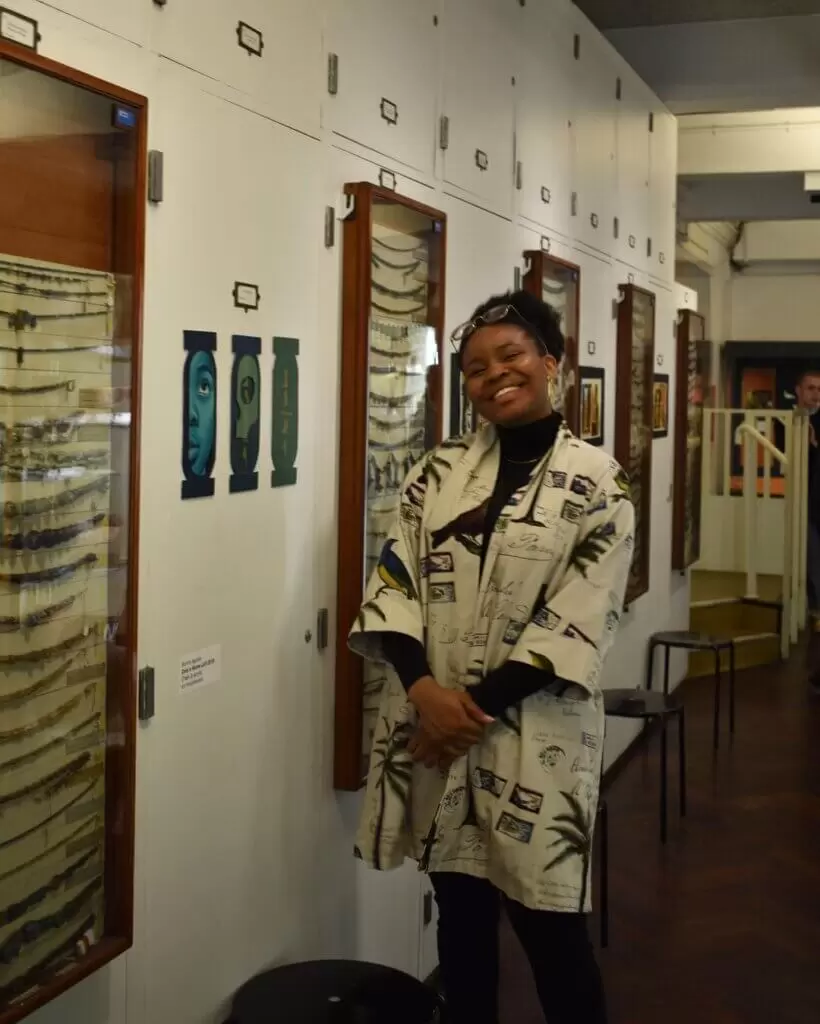
I spent a lot of time drawing and researching contemporary art and the market because I’d always been fascinated by the theory, the practical and everything in between.
Bunmi Agusto
In works like The Blinded a portrait from the artist’s fictional Aruaro clan inspired by her real-life maternal tribe the Edo people, “Aruaro” means “blind” in the Edo People’s language Bini. Agusto depicts tribal marks as ancestral eyes nestled in cheeks. In contrast, their eyes are closed throughout adolescence and only open when they encounter their ancestors in their dreams, signifying the alignment of perspectives to the point of political awakening.
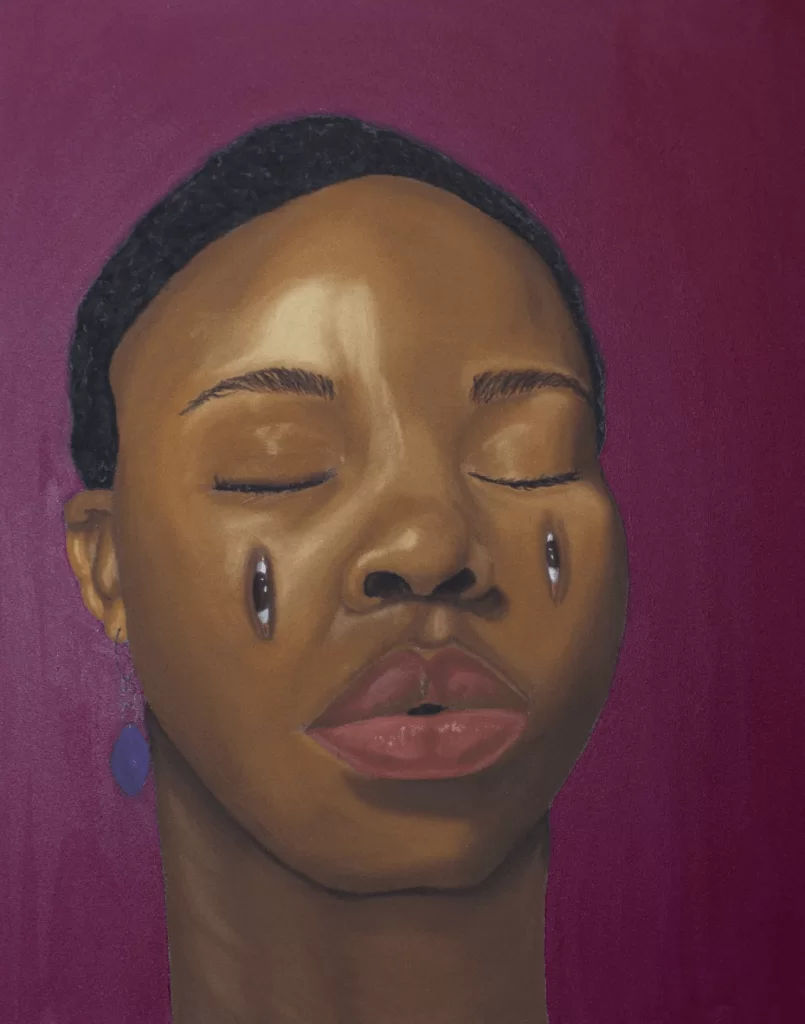
2020 Pastel pencils, ink and acrylic on Ampersand board 10 x 8 inches
Agusto’s body of work is an authentic collection of creative consequences taken from a destructive government unseen by silence while preserving her peers importance.
Bunmi has a bright future ahead, graduating with a First Class degree in Fine Art from Central Saint Martins UAL and is already collecting awards and bursaries. Regarded as one of the Rising Black Students in the UK by Rare Rising Stars. In this interview, we learn more about the her creative process, inspiration and more.
Q: For those who don’t know you, can you please introduce yourself?
Bunmi Agusto: My name is Bunmi Agusto. I am a visual artist from Lagos, Nigeria. I recently graduated from Central Saint Martins with a BA in Fine Art. I mainly create mixed-media paintings and drawings, but also digital illustrations, videos and essays. My work depicts scenes following eight fictional clans I created on a transcendental plane. The lives of these hybrid figures reflect aspects of our reality and act as a means of cultural commentary.
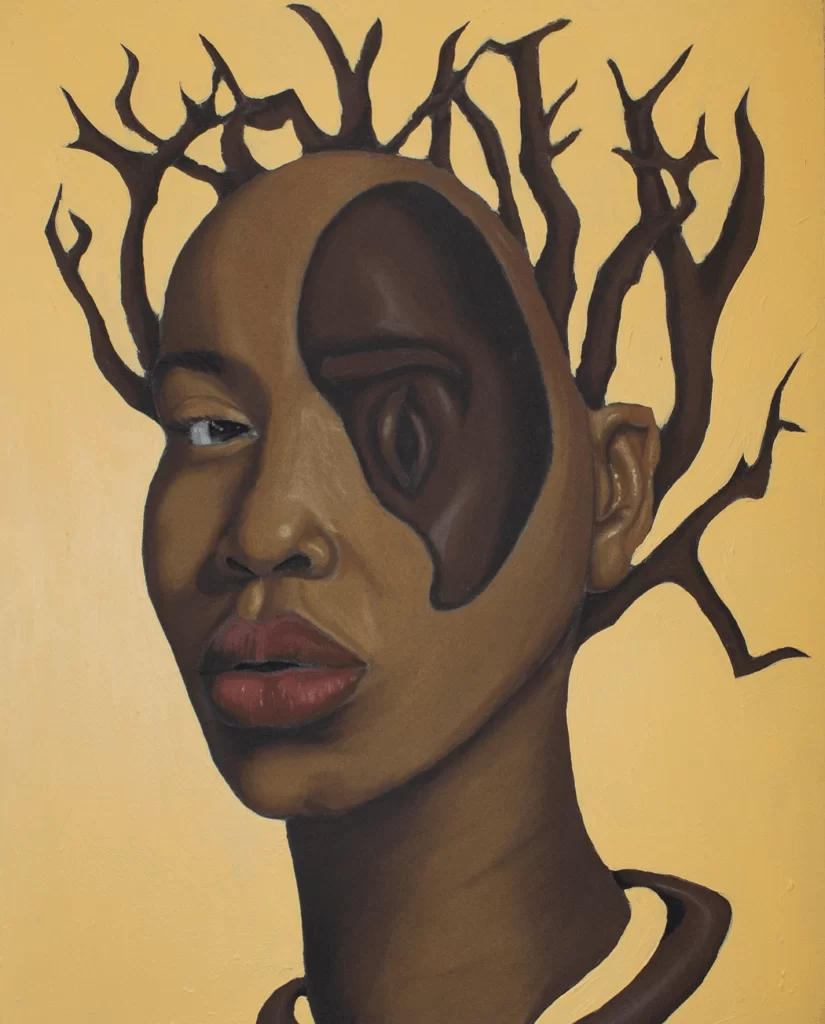
2020 Pastel pencils and acrylic on Ampersand board
10 x 8 inches
Q: What is your inspiration, and why do you do what you do?
Bunmi Agusto: I’ve been a critical thinker for as long as I remember. I was an inquisitive child who questioned almost everything. Growing up, I found myself compelled to draw so art became my way of posing questions.
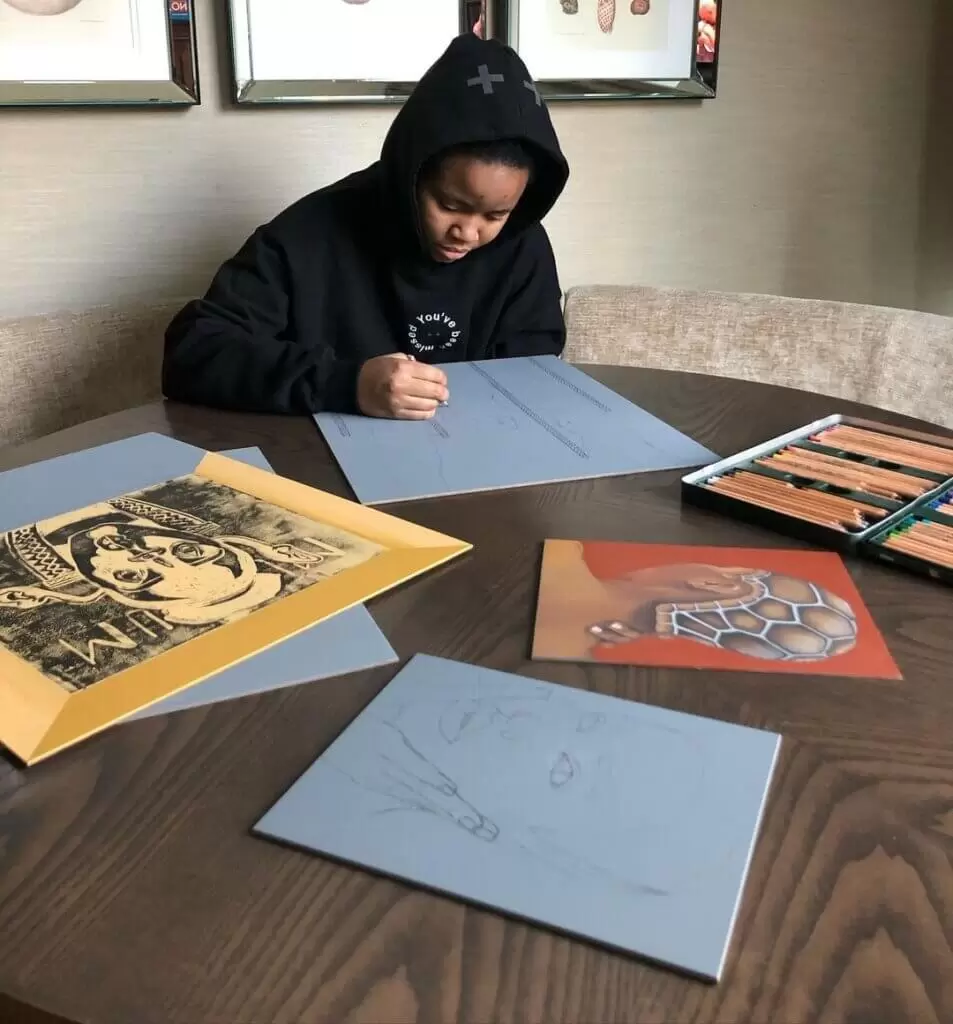
Q: What would you say your artistic background is? How long have you been working?
Bunmi Agusto: From age 10 to 15, I was definitely already a fan of art. I spent a lot of time drawing and researching contemporary art and the market because I’d always been fascinated by the theory, the practical and everything in between. I discovered the concept of art school when I was 14 and thought it was the coolest thing ever but in Nigeria, saying you want to be an artist is often met with “Get a proper degree first for insurance,” and that is even a good response. After my parents realised how much I was willing to put into an art career, they became increasingly supportive. I attended a Sixth Form college with a great art program and then, Central Saint Martins. So I’ll say I’ve been an artist for five and a half years.
Q: Can you tell us about your creative process?
Bunmi Agusto: Most things come to me like a vision. I then do a rough sketch in my notebook and build it into my overarching narrative. There’s a quote by Yves Klein: “My paintings are only the ashes of my art.” I spend a lot of time doing research so the compositions that appear in my mind are always as a result of that.
Q: What is the reason behind your fusion of surrealism with Nigerian culture and identity in your work?
Bunmi Agusto: Throughout my career, even when I was in secondary school, I have always studied culture. When I was a teenager in Nigeria, it was this very angsty, but valid, critique of cultural traditions. Then I moved to England when I was 16 and my work became about me studying the African diaspora. I always say I became Black when I moved to England because Blackness is a reflected state. In Nigeria, I didn’t have to think of the ramifications of the colour of my skin on a daily basis but I did in England. Essentially, I became an alien in both lands because I was Black and Nigerian in England and in Nigeria, I was westernised.
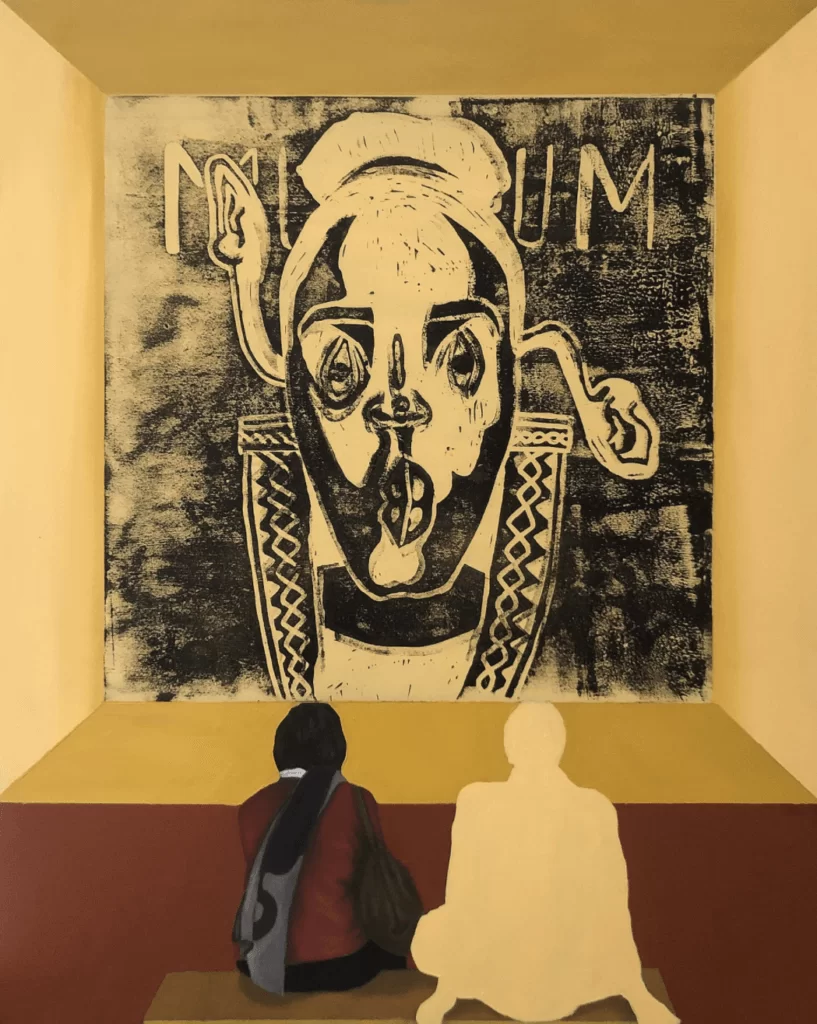
2020 Pastel pencils, ink and acrylic on Ampersand board 20 x 16 inches
Therefore, I began to consider terms like ‘alien’ and ‘hybrid’ in cultural theory and began to think about them in the realm of pop culture. I considered how aliens are depicted in the Marvel Cinematic Universe. I even looked at Scooby-Doo episodes and questioned the difference between the monster costumes and the humans underneath them. It was then I really understood alienness and hybridity simply as a foreign reconfiguration of the human form. As a result, I decided the best visual language to illustrate this idea was surrealism.
Q: What was the first piece of art you made that cemented your path as an artist?
Bunmi Agusto: I believe it was my final piece for my Art IGCSE. This piece is why I say I started my career in 2015. It was the one that had everyone telling me to take pursuing an art career seriously. The piece is titled Cover Up and it depicts the ancient Queen Idia mask from the Benin Kingdom with a crack revealing my face beneath. In the self-portrait, I don’t look uncomfortable, but I don’t look happy either.
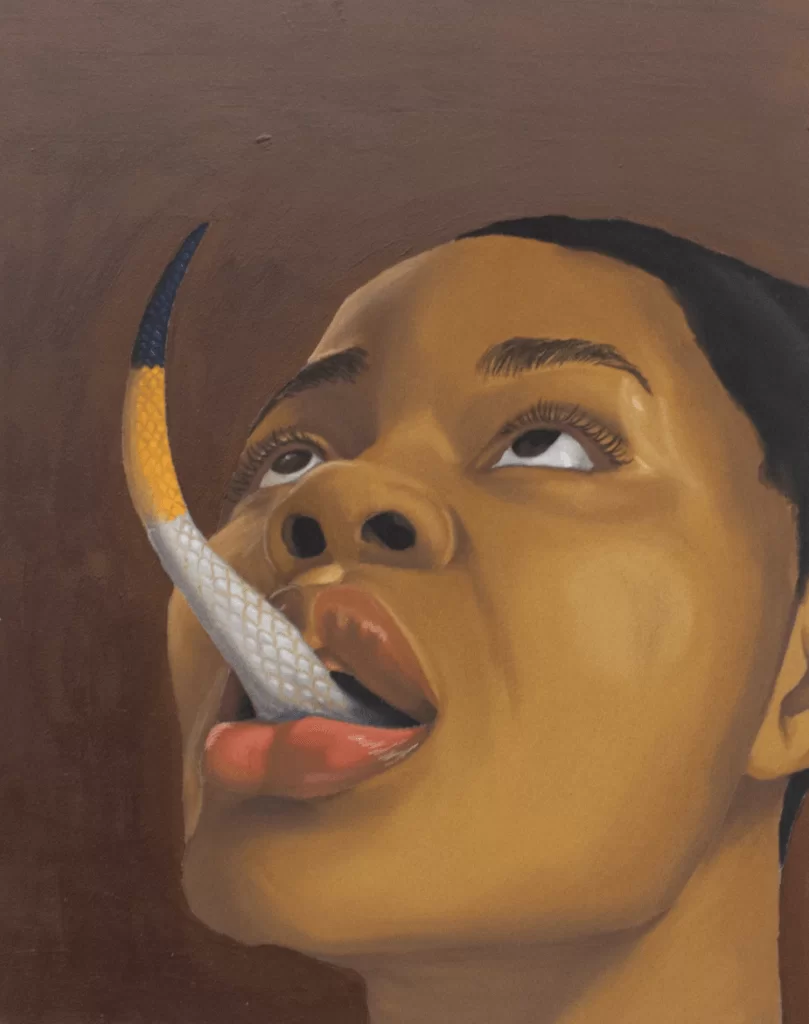
2020 Pastel pencils and acrylic on Ampersand board 10 x 8 inches
I’m just there and that straight face showed my mixed feelings about how older generations simultaneously saw tradition as a method of protection and weaponised it to control others. In that piece, I was both consensually wearing the mask, the symbol of my culture, and trapped within it.
Who are your biggest inspirations?
Bunmi Agusto: In the art world, my trinity of Nigerian contemporary female artists are Toyin Ojih Odutola, Njideka Akunyili Crosby and ruby onyinyechi amanze (intentionally lowercase). Otherwise, I have a large mix of historical and contemporary influences from both Nigeria and the West, from Caravaggio to Jonas Wood, and from ancient Nigerian traditional practices to Demas Nwoko. I also like to cite the Marvel Cinematic Universe and The Sims as huge influences because they got me into the practice of creating worlds. The artists that then accelerated that for me were Ojih Odutola, amanze and Ian Cheng.
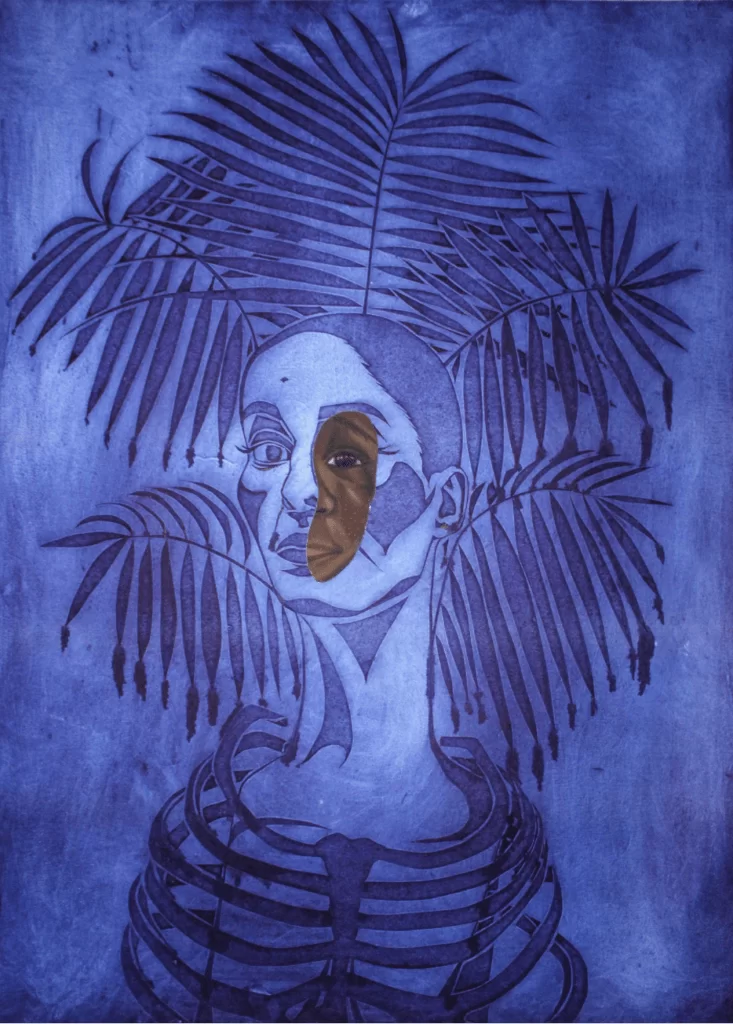
2018 Pastel pencils on pastel card & ink on paper 35.4 x 25.6 inches
What do you think about the current state of the art world for Black artists?
Bunmi Agusto: Creatively and in terms of value, many Black artists are being given their due. Practically and in terms of the art market, I think many Black artists are being put in vulnerable positions due to collectors with questionable intentions and art market mechanisms that encourage flipping in the secondary market at auction. This includes African artists to an extent but my main concern here is that institutions that help establish certain levels of value have not been put in place domestically in countries in Nigeria. However, there are ongoing attempts at rectifying this that I am hopeful for.
What role does the artist have in society?
Bunmi Agusto: The artist is an observer with a high level of visual and/or symbolic literacy. Either intentionally or unintentionally, they document a piece of history. However, there are different roles of an artist in different socio-political contexts, especially historically. There isn’t even a word for artist in some languages. According to Wangechi Mutu, the closest terms for “artist” in her mother tongue Kikuyi is “magician” or “a person who uses objects and imbues them with meaning and power.” Therefore, sometimes an artist is a magician, sometimes a decorator and sometimes a translator. Eventually, they all write a part of history in some way.
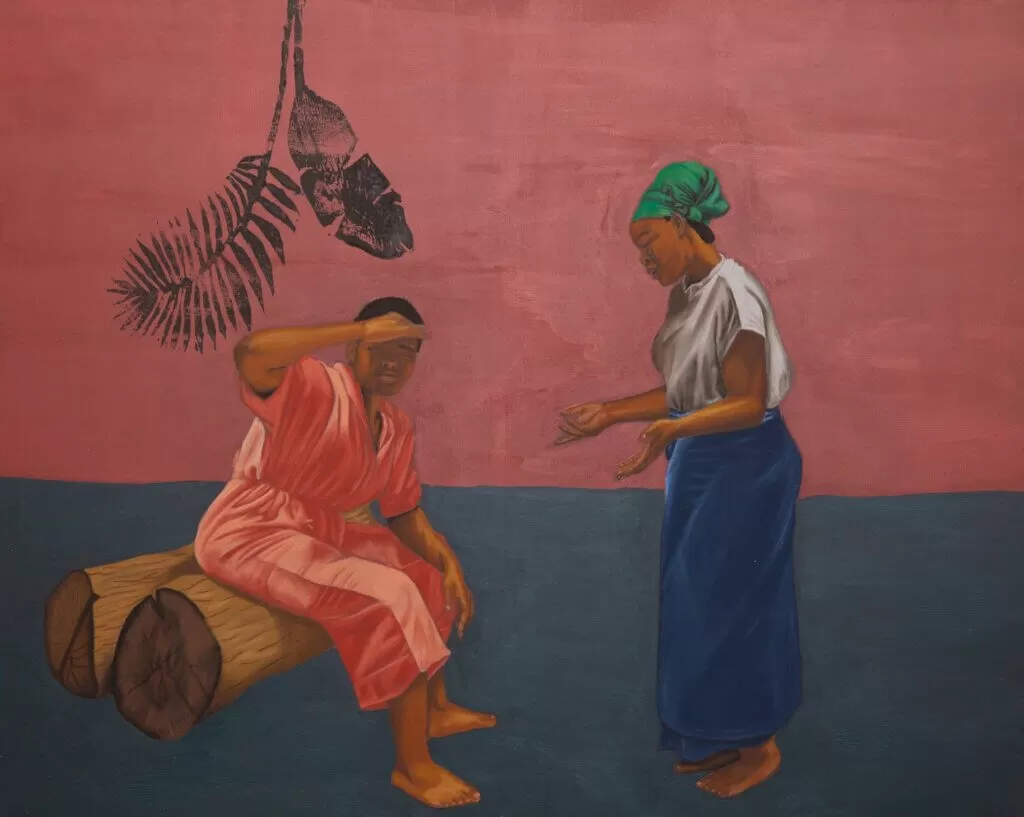
What’s next for you as an artist?
Bunmi Agusto: I’d love to do some residencies. As an Amaro (a descendant of slaves who revolted and returned to Nigeria from Brazil during the Trans-Atlantic Slave Trade) who grew up in Lagos, I exist in a complex cultural triangle between Nigeria, Brazil and Portugal. I’m confronted by this everyday because my surname ‘Agusto’ is Brazilian-Portuguese and I was born and raised in Lagos, a city given its name by Portuguese merchants who settled in the area in the 18th century. Therefore, I’d love to travel to both Portugal and Brazil and explore these connections.
Everything Good Will Come
5 December 2020 – 10 January 2021
https://www.instagram.com/studioagusto/
©2020 Bunmi Agusto


